"Glory, a companion of Russian weapons, will perish if we now shamefully yield to the Romans"
1050 years ago, the Byzantine army struck a surprise blow at the allied Bulgarian-Russian squads. The Romans took the Bulgarian capital Preslav by storm and laid siege to Dorostol, where the camp of Svyatoslav Igorevich was located.
The Greeks Strike Back
During the campaign of 970, the "Tavro-Scythians" of Svyatoslav Igorevich defeated the Byzantine army (Bulgarian campaign Svyatoslav; Bulgarian campaign Svyatoslav. 2 part; War Svyatoslav with Byzantium. Battle of Arkadiopol). The Rus came to the approaches to Constantinople. However, there was no strength to attack the Byzantine capital. The Byzantine Emperor John Tzimiskes paid the tribute.
Svyatoslav:
The Greeks wrote after the war history war with Svyatoslav in a way that suits them. The Russians were shown as wild barbarians. Romeev as "invincible" warriors who killed "Scythians" thousands and tens of thousands and lost in battles from a few people to several dozen. The Greeks allegedly won all the battles. It is not clear only why the "losers" Rus and their allies devastated the provinces of Byzantium and reached the enemy capital.
Peace has been restored. However, the Second Rome was not going to comply with it. The army of the Scythians-Rus, their allied Bulgarian squads, the cavalry of the Hungarians and Pechenegs left the borders of Thrace and Macedonia. The Byzantine Empire found peace in order to immediately begin preparations for a new war. Oaths and treaties were not observed in Constantinople, as the "barbarians" believed them.
In winter, the Greek infiltrators reported favorable news... The Rus did not expect an attack and, together with the allied Bulgarians, placed "winter apartments" in the cities of Northern Bulgaria. Pechenegs and Hungarians left for the winter in the trans-Danube and Transnistrian steppes. Prince Svyatoslav himself with his retinue was in the fortress Dorostol (modern Silistra). Reinforcements from Kiev did not arrive, the war was not expected so soon. Byzantine agents reported that the Russian prince believed the word of the Basileus about peace, so the mountain passes of the Balkan Mountains were not closed even by small outposts.
John Tzimiskes was actively preparing for a new battle with the Russians. He could not come to terms with the fact that Svyatoslav occupied Bulgaria. The Romans themselves claimed the rich Bulgarian land. In addition, the strengthening of the allied relations of the warlike Rus with the Bulgarians, who until recently themselves went under the walls of Constantinople, was dangerous for Byzantium. And Svyatoslav wanted to move the capital of Russia to the Danube. Tzimiskes suppressed the rebellion in Asia Minor. New troops were approaching Constantinople from the Asian provinces of the empire. Military exercises were held daily under the walls. The army of Barda Sklirus returned to Thrace and Macedonia. In Adrianople, which became the rear base of the army, was taken weapon, bread, fodder and other supplies. Equipped a fleet of 300 ships. At the end of March, Tzimiskes conducted a review the fleet... The ships were supposed to block the mouth of the Danube, cutting off the route of withdrawal for the rook flotilla of the Rus and preventing possible enemy reinforcements from arriving.
Storming Preslav
In the spring of 971 Basileus Tzimiskes, at the head of the guards ("immortals"), solemnly set out on a campaign from Constantinople. The whole army was already in Adrianople. The Greek historian Leo the Deacon wrote that in the army, in addition to the guards (armored cavalry), there were about 15 thousand selected infantry (hoplites) and 13 thousand cavalry. There was also a large baggage train with siege vehicles and supplies.
The Byzantine emperor feared war with Svyatoslav Igorevich. He has already become well acquainted with the "men of blood who defeat the enemy with weapons." The Byzantine chronicler transmitted the words of the emperor, spoken to the commanders before the start of the campaign:
Therefore, the Byzantines made the main bet on the surprise of the attack. Otherwise, the Russians and Bulgarians would have easily closed the mountain passes with small forces, they were inaccessible. Then Svyatoslav could mobilize the forces of his allies, Bulgarians, Pechenegs, call new regiments from Russia. As a result, Byzantium would again face a large-scale invasion of the "Scythians", which led to disaster. In a direct battle, the Second Rome had no chance in the fight against such an experienced, skillful and fierce commander as Svyatoslav.
Therefore, Tzimiskes ordered to lead the troops into Northern Bulgaria "along the gorges and steep gorges." The Byzantine Basileus noted:
Without warning about the breaking of the truce, a large Byzantine army crossed the mountains on April 10, 971. The Greeks occupied the passes with advanced detachments, followed by the rest of the troops. On April 12, the imperial army suddenly appeared at the walls of the Bulgarian capital Preslav. The Bulgarian Tsar Boris with his family and the squad of the governor Sfenkela were in the city. Together with the Bulgarian soldiers, Preslav was defended by about 7-8 thousand people.
The Russians were not embarrassed by the enemy's numerical superiority. They bravely went beyond the walls and gave battle to the Romans. Russian and Bulgarian squads built a "wall" (phalanx), covered themselves with large shields, and attacked the enemy themselves. The battle was fierce and stubborn. The Greeks were able to turn the tide in their favor only by throwing heavily armed cavalry into the flank counterattack. Rus and Bulgarians had to retreat behind the walls. The short siege of Preslav began.
The Romans tried to take the fortress on the move. But the defenders fought back fiercely, and the Byzantines had to retreat. The next day, the siege engines arrived. Stone throwers brought down boulders and pots with "Greek fire" on the walls of Preslav. The defenders began to suffer heavy losses. The Greeks resumed their attacks, but the Rus held on and threw back the enemy. Yet the forces were clearly unequal. Two days later, the Greeks broke into the blazing Preslav. Part of the Russian and Bulgarian troops led by Sfenkel (possibly Sveneld) cut through the encirclement and went to Dorostol to Svyatoslav. The remaining warriors fought the last battle at the royal palace and all were killed. Tsar Boris and his family were captured by the Romans.
Thus, the Byzantine command seized the strategic initiative. The attack was sudden and swift. The Greeks quickly took the well-fortified Preslav, a large Russian-Bulgarian garrison was defeated. The Bulgarian Tsar Boris was taken prisoner. The Bulgarian nobility began to go over to the side of the Romans. Some of the cities, frightened by the fate of the capital, surrendered without a fight. Svyatoslav found himself without allies, almost without cavalry (allied Pechenegs and Hungarians). Until now, Svyatoslav Igorevich himself imposed the rules of the game on the enemy. The Rus attacked first, seizing the initiative. Now the Russian prince was forced to defend himself.
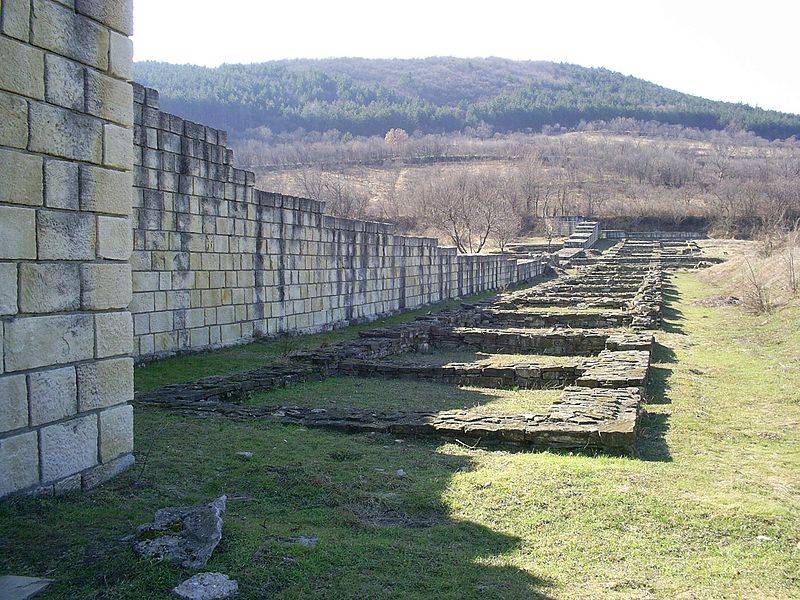
Veliki Preslav
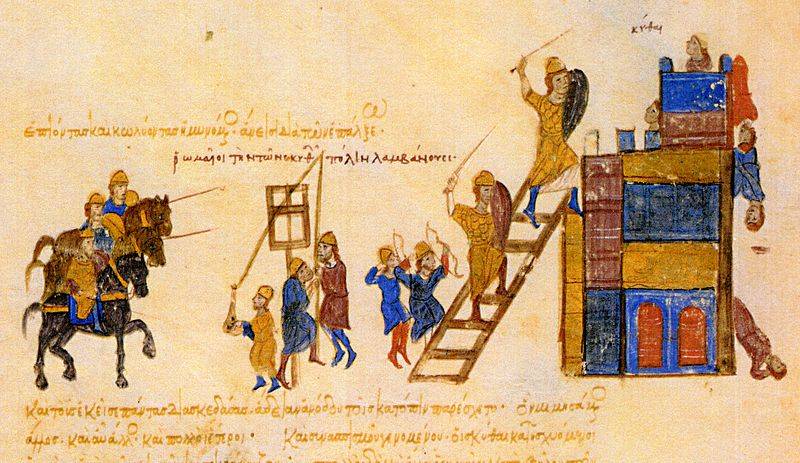
Byzantines storm Preslav, XI century chronicle, John Skylitsa
Battle of Dorostol
On April 17, 971, John Tzimiskes set out from Preslav to Dorostol. On April 23, the Byzantine army, reinforced by the subjugated Bulgarian feudal lords, approached Dorostol. The power of the "Scythians" Leo the Deacon estimated at 60 thousand soldiers, Skylitsa exaggerated even more. In reality, Svyatoslav had no more than 15-20 thousand soldiers, Russians and Bulgarians. The Romans had 40-60 thousand soldiers and the ability to constantly receive reinforcements, replacing the dead and wounded soldiers. Also, the Greeks constantly strengthened their positions in Bulgaria, subjugating new cities. And the local nobility with their squads went over to their side. Svyatoslav in Dorostol was isolated from help.
The Rusichi exterminated the advance detachment of the Greeks, which was ambushed. However, this could not stop the large army of Tzimiskes. In front of the city there was a large plain, convenient for battle, in places it was crossed by small rivers and streams. The city stood on the banks of the Danube. The fortress was strong with high and thick walls. Two fortress gates went straight into the field and were protected by massive stone towers. When the Greeks approached Dorostol, the Rus were already prepared for battle. They were not going to hide behind the walls and went out into the field, "closing their shields and spears like a wall."
The Russian "wall" was a formidable force. Thousands of warriors covered themselves with shields the size of a man and put their spears forward. The Russian infantry was armed no worse than the Byzantine hoplites. Warriors in armor and chain mail were placed in the first rows. They were armed not only with spears, but also with axes (axes), swords, chasing, clubs and long knives. Archers were in the back rows. The flanks were usually covered by cavalry - heavily armed Russian princely and boyar squads, light cavalry of the allies. But this time there were almost no cavalry. The dense and well-armed formation of the infantry could withstand the blow of the armored cavalry of the Romans - the cataphracts.
The battle formation of the Greeks consisted of two lines: in the first line in the center of the infantry, on the flanks of the cavalry, in the second line - archers and slingers. Light infantry (archers) first fired at the enemy, then retreated to the second line. Basileus John Tzimiskes ordered to trumpet the general attack. In a fierce battle, the Russians repulsed 12 attacks of the Byzantines. Success hesitated: neither the one nor the other side was able to take up. The Byzantine chronicler noted:
In the evening Tzimiskes tried to make a decisive attack and defeat the "barbarians". He gathered all the cavalry into a single fist and threw it into battle. However, the Russians threw back the enemy. The Byzantine cavalry was unable to break through the Russian "wall". After that, Svyatoslav Igorevich took his squads behind the walls. The battle did not reveal a winner. It is worth noting that among the Russians and Bulgarians, women from the fields fought (warrior maidens). Chronicler Skylitz wrote that
Siege
On April 24, 971, the Romans erected a fortified camp. On a small hill, they set up tents, dug a moat, poured a rampart and erected a palisade on it. Soon Greek ships appeared on the Danube and blocked Dorostol from the Danube. The Rus drew their boats ashore so that the enemy would not burn them. They were carried to the walls, under the protection of the archers.
On the third day of the siege, April 26, another great battle took place. Prince Svyatoslav Igorevich led his squads into the field, challenging the enemy. The Greeks rushed to the attack. But all their attempts to break down the Russian wall of shields and spears were unsuccessful. Voivode Sfenkel was killed in a fierce battle. The battlefield remained behind the Russians and remained on it for the whole night. The Greeks went to their camp for the night. On the morning of April 27, the battle resumed. By noon, when Tzimiskes withdrew the main forces from the camp, the Russians left for the city.
After that Svyatoslav Igorevich, obviously, in order to save his strength for a decisive battle, changed his tactics. For three months, until July, Svyatoslav's soldiers did not leave the city to give battle to the enemy. The Rus dug a deep moat around the city to prevent the enemy from reaching the walls. They began to make sorties along the river on boats in order to seize provisions, "tongues", reconnaissance of the enemy's forces. The Byzantines began a correct siege, dug up all convenient passages to the city with ditches, and strengthened their patrols. Siege engines tried to smash the walls. Russians and Bulgarians suffered notable losses and began to suffer from food shortages.
The Greeks noted the high fighting spirit of the Rus throughout the entire siege of Dorostol. Lev the Deacon cites a retelling of one of the speeches of the great Russian prince and commander:
Tzimiskes was not interested in a long siege. Things were not going well in his rear. They tried to overthrow him in Constantinople. New conspiracies were brewing. New squads could come to Svyatoslav.
To be continued ...
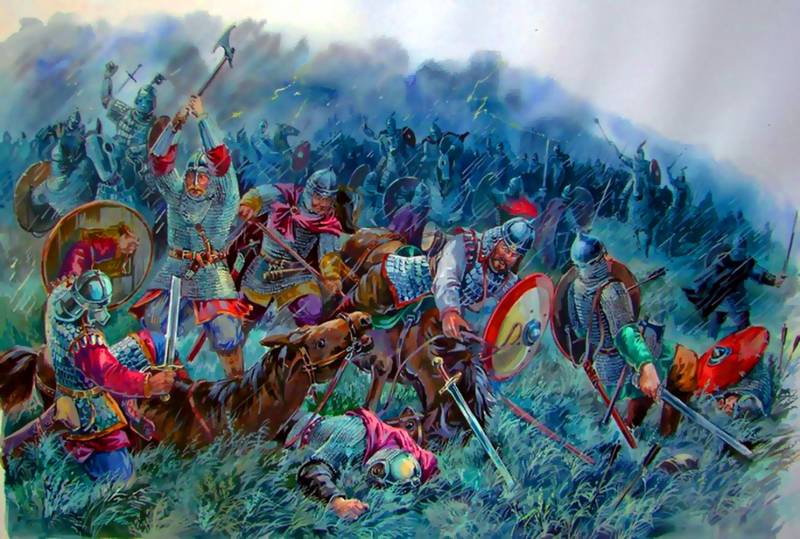
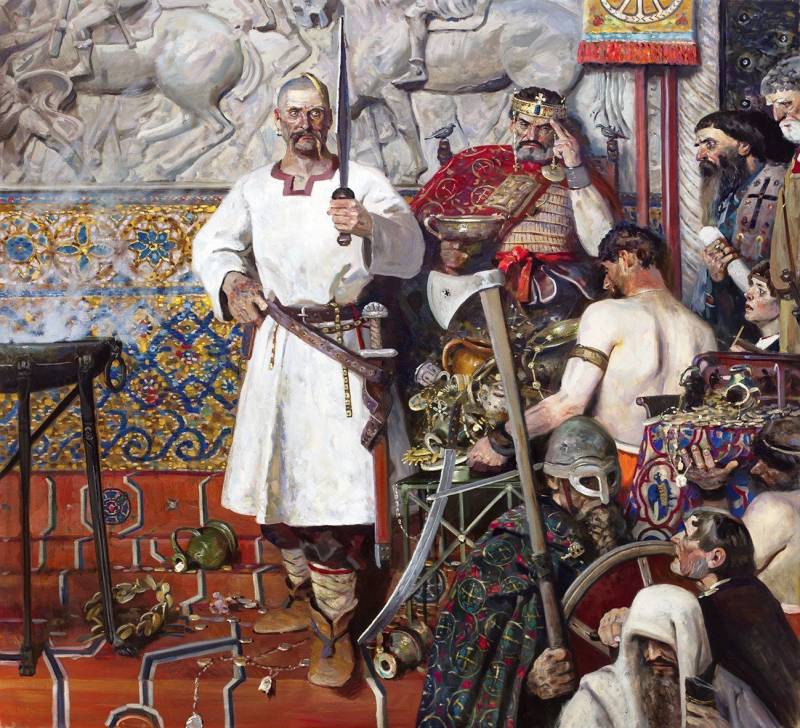
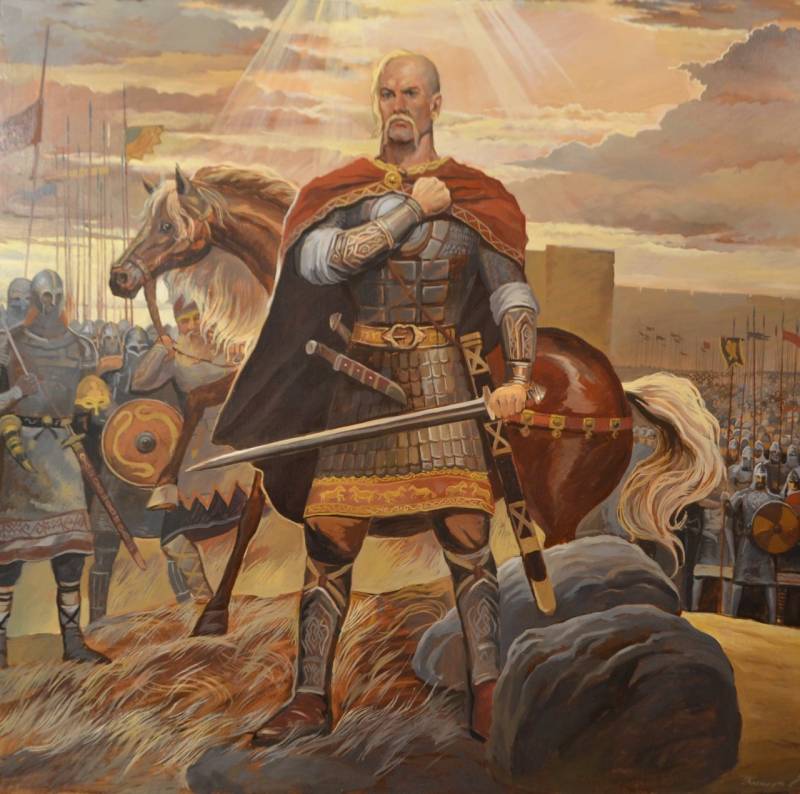
Information